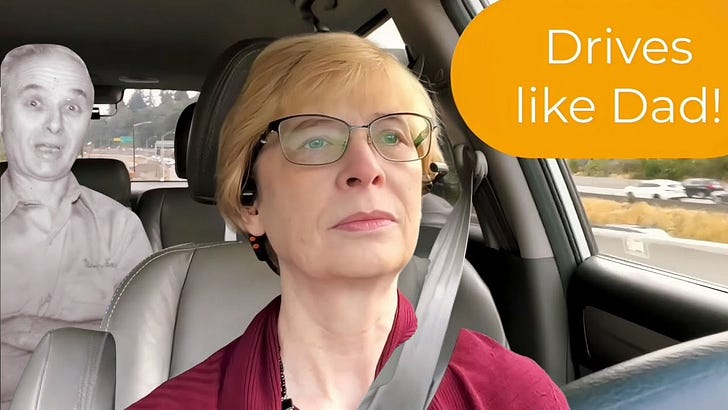Last week I wanted to tell a story about my dad near the anniversary of his birth, but the words were heavy and blah.
Capturing family memories can be tricky. Our minds weave a web of interconnected experiences, switching from one emotion to the next without warning — funny, sad, reflective, inspired. It can be hard to write them the way you think them. Sometimes when you try, the web-like nature of your thoughts disintegrates into a linear series of paragraphs marching heavily down the page.
One way to get around this is to record yourself talking while you walk, or drive, or do housework.
So I turned on my phone and started thinking out loud about Dad, my brother, and a vital records document. Before I started this conversation with myself, I had a basic notion of what I wanted:
Target audience: Family, ages 20-40, now and in the future.
Potential medium: Video. I like written word, but it wasn't working here.
Story Content: I wanted to follow that web of thoughts while focusing on a core message: You can rise above your circumstances. You can be a hero to your family. (Do you see how this could get too heavy?)
Story Guidelines: I keep some guidelines in mind for spoken stories. Matthew Dicks outlines them in his book, Storyworthy. Did I follow them perfectly? Not at all. Maybe someday. But they were still in my head.
Loosely translated:
Your story should show change. At the beginning something is one way; at the end it has transformed in some fashion.
It should be your story. If you're talking about somebody else, tell it from your point of view.
Tell it like you would if you were talking to somebody over a meal — just sitting there talking.
Sandwich the sad parts with humor, or a short pause. Give people time to adjust.
Laugh at the beginning; cry at the end. (When applicable for that type of material.)
These seem like pretty good guidelines. He has many others. You can find his book at the regular book places.
We all have defining moments in our lives. When you're telling family stories, you'll be looking for those moments — for yourself, your family, neighbors, schoolmates. At different times you might view a defining moment from different perspectives, depending on your current stage of life and the memories that bubble up.
One of my defining moments was the loss of a brother. At age 12, I felt devastation and shock. The playmate that I wanted so badly was finally given to me, then suddenly snatched away. I lived a sheltered life. I knew nothing of death. And when I speak now with friends and family members who were near my age, I realize that we share this bond. It was also their first experience with death. It was also their loss. We lost our innocence together.
At age 30, I thought about the same event as a mother, taking joy in my own 5-year-old son and beginning to sense what my parents must have felt when they lost theirs.
At 40, I wondered if my parents could have handled a teenage son!
And now, nearing age 65, my thoughts about this defining moment focus on my father.
Dad handled grief and loss in a calm and steady manner, perhaps because he had so much practice as a young man. His brother Ralph died when Dad was two. Susie and Clarence both lost a fight with Influenza one day when he was eight. His sister Florence passed away when he was 11, his mother when he was 15, his father five years later, and brother Ashton four years after that.
By the time he was 24, Dad's 10-person family of origin had dwindled to three, but I don't mention this in the video. There isn't time, and it doesn't contribute to my overall message, which has been refined in the telling: a young man from a destitute family who was bullied by his peers grew up to be a source of quiet strength to his wife and daughter. He overcame the odds, and so can you.
I also don't mention the fact that when I was a kid, I was embarrassed for Dad to pick me up at school, because he would say hello to the other children and maybe pat one of them on the head. Oh, the horrors! But this is all in my mind as I'm telling the story — the fact that he was much stronger than I realized, but I was too wrapped up in myself to notice.
Do you see how this works? I think. I talk. Some of it goes in the story. Some just settles into my soul. It's good for me. It's good for my family. And in this case, my descendants will be able to see Great Grandma as she really was. This isn't Polished YouTube Grandma. This is Driving In The Car Grandma. She's sad. She's reflective. She's cracking herself up. She drives over a bump. Does she even know where she's going?
This isn't the way I always capture stories, but when the going gets tough, Grandma goes driving. So come hop my car, and let's wish my Dad a happy birthday.




I really enjoyed learning about your father and thought your video a magnificent way to remember him and share his legacy
Bittersweet as all relationships are over time. Thank you for sharing 💖